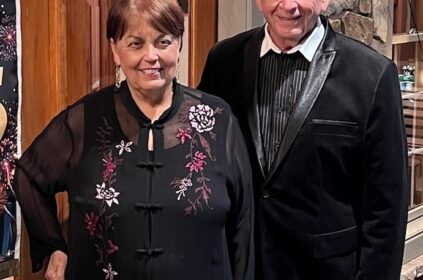Written by Matthew Rosenblum, Survivor, Pancreatic Cancer
This story was republished with permission from Elephants and Tea, a magazine focused on the adolescent and young adult (AYA) cancer community.
I was diagnosed with stage 4 pancreatic adenocarcinoma—the much dreaded, frequently lethal cancer of the pancreas—in early 2021. At the time, I had just turned 33 and was living in Durham, North Carolina, while the world grappled with the COVID-19 pandemic. If we were all navigating an atmosphere thick with ambient death and uncertainty, I felt the weight of that reality far more acutely than most. The lethality of pancreatic cancer is such that it is often regarded as a death sentence.
You probably don’t know much about pancreatic cancer. I didn’t either until it became my reality. Yet if you know anything about it, I bet it’s this: it’s supposed to be deadly— and it’s typically associated with the elderly. When people learn that I’m a pancreatic cancer survivor, they often share tales of great-uncle Morton or great-aunt Mildred, who passed away at 90 after leading fulfilling lives. “It took them so fast,” they say, their shock palpable. And then they look at me, incredulous. “You’re too young for that,” their expressions imply. My boyish good looks only amplify their surprise.
The truth is that pancreatic cancer predominantly afflicts older adults. The American Cancer Society reports that about 90% of cases are diagnosed in individuals over the age of 55, with the average age at diagnosis being around 70. Pancreatic cancer in younger populations, particularly among Adolescents and Young Adults (AYA), is considered exceedingly rare. Studies show that pancreatic ductal adenocarcinoma (PDAC) represents just 0.3% of all pancreatic cancer cases in people under 40, with the incidence dropping to an extraordinary 0.1% in those under 20 (Lüttges et al., 2004). This minimal occurrence underscores how unusual PDAC is in younger patients, and when it does happen, it’s often linked to rare genetic syndromes. So yeah, I’m the odd one out.
Let that sink in. From a statistician’s perspective, I might not even count as a whole person—but that’s precisely the problem. The dehumanization comes not just from being a number, but from being a number so small it barely registers. In an era where healthcare is driven by numbers, data, and economic viability, those of us with rare conditions often find ourselves marginalized, struggling to access research, funding, and even awareness. The statistics can tell you how rare we are, but they can’t measure the daily indignities, frustrations, and isolation we face as we navigate a system designed for the majority.
No one really expects pancreatic cancer in their early 30s. I didn’t. My doctors certainly didn’t either. This would be the perfect moment for Cardinal Ximénez and his assistants, Cardinal Biggles and Cardinal Fang, to burst into the room, exclaiming, “Nobody expects the Spanish Inquisition!”—just like in that Monty Python sketch. It’s worth noting that Eric Idle, the Monty Python star, is also a pancreatic cancer survivor. Idle’s account of his diagnosis is poignant and reflective of his lifelong ability to navigate difficult situations with humor. He had previously joked with his doctor that pancreatic cancer was the “quickest, surest, and most sudden cause of death.” Years later, he found himself confronting that exact diagnosis.
In 2019, during what Idle described as routine tests, his friend and doctor discovered a tumor on his pancreas. The news was shocking—Idle, by his own admission, expected nothing more than the usual medical checkup, only to be met with the devastating revelation that he had one of the most lethal forms of cancer. This kind of shock is familiar to many pancreatic cancer patients, as the disease often goes undetected until it reaches an advanced stage, making the diagnosis not only unexpected but profoundly life-altering.
Idle’s response was characteristically humorous—he named the tumor “Kenny.” By giving the tumor a name, Idle and his wife transformed something terrifying into something more manageable. In his essay, he writes, “Pancreatic cancer freaks people out, but Kenny? Kenny is manageable.” Naming his cancer became a profound coping mechanism, a way to distance themselves from the gravity of the illness and reclaim a sense of control in an uncontrollable situation.
Humor can serve as a protective shield, a way to deflect the fear and grief accompanying a cancer diagnosis. As Gillian Rose suggests, we can hide our sorrow with laughter. For me, humor became a means of processing the absurdity of my situation. I found myself making jokes about my diagnosis— jokes that might make others uncomfortable— but for me, they were a way to maintain some semblance of normalcy. They allowed me to step outside the patient role, if only for a moment, and view my situation with a degree of detachment. In those moments, I could laugh in the face of what felt overwhelmingly tragic, carving out a space where fear and absurdity could coexist.
Yet this approach is not without its challenges. Humor is a double-edged sword. It provides relief and a sense of control, yet it can also serve to mask the very real fear and grief that accompany cancer. Balancing humor with the acknowledgment of the gravity of the situation is a delicate dance, one that I navigated as best I could throughout my diagnosis.
Whether at 33 or 73, cancer—like death— feels like an ambush. Aleksandr Solzhenitsyn, the great Russian novelist and cancer survivor, articulates this experience in his novel Cancer Ward: “Unforeseen and unprepared for, the disease had come upon him, a happy man with few cares, like a gale in the space of two weeks.” These words resonate deeply with me, particularly because they appear in a chapter titled “No Cancer Whatsoever,” where the protagonist, Pavel Nikolayevich Rusanov, anxiously questions his doctor, who reassures him that his alarming tumor is not cancer. That moment, steeped in cruel irony, mirrors my own experience when my doctor confidently told me, “You definitely don’t have cancer.”
When my symptoms first began—dark urine, bone-white stool, and relentless itching that kept me awake for nights—I found little comfort in the responses of my doctors. They explained away my symptoms as being connected to the Crohn’s disease I had managed since I was 25. Following a weekend in the emergency room filled with various tests, they discovered a stricture in my bile duct. I was sent home with a stent, and the doctors assured me it was nothing to worry about. After all, this was a reputable hospital. If they weren’t concerned, why should I be?
Weeks passed, and I returned for a second endoscopic procedure. My symptoms returned with a vengeance. It felt as if I had crossed an invisible border between two worlds. As Susan Sontag poignantly observed, “Illness is the night-side of life, a more onerous citizenship. Everyone who is born holds dual citizenship, in the kingdom of the well and in the kingdom of the sick.” Until that moment, I hadn’t always felt entirely comfortable in the kingdom of the well, but I wasn’t a stranger there. Suddenly, however, it felt as though I had been unwillingly enfranchised as a permanent resident of the kingdom of the sick, where the rules were unfamiliar and unforgiving.
The final blow came after another round of tests. I was at work, trying to handle an irate customer returning shrimp purchased three weeks earlier when my phone buzzed. The test results had come in. I opened the app, expecting to confirm the all-clear. Instead, there it was: adenocarcinoma. No one expects the Spanish Inquisition, and no one expects to see a word like adenocarcinoma in their test results. I didn’t know exactly what it meant, but I knew it wasn’t good. Cancer terms all sound like villains from Star Wars—sarcoma, melanoma—are the Star Wars writers simply stealing cancer words?
I panicked and quickly Googled it. I confirmed my worst fears: adenocarcinoma is cancer that forms in glandular tissues. I felt my stomach drop. Two agonizing hours later, my surgeon called, explaining how we would move forward. “If this is a tumor, it’s small, and I’m confident we can get all of it.” I was scheduled for a pancreatoduodenectomy— better known as a Whipple.
When I woke up in the hospital, I knew something was very wrong. My surgeon’s expression told me everything. He looked crushed. The “small tumor” they had planned to remove wasn’t so simple after all. It was metastatic pancreatic cancer, and instead of removing it, they had to sew me back up. The first person to treat me afterward was the same endoscopist who had declared me cancer-free. She looked embarrassed, crushed even, but I couldn’t bring myself to give her a hard time. This wasn’t what anyone expected. No one expects the Spanish Inquisition.
Pancreatic cancer is notoriously difficult to diagnose, with symptoms that frequently overlap with common conditions like gallbladder disease or irritable bowel syndrome. This often leads to misdiagnosis and delayed treatment, particularly in younger patients like me. The doctors had assumed that cancer couldn’t be the culprit, causing delays in diagnosis that would prove fatal. When I heard my oncologist say, “If you’re lucky, you’ll have one to three good years,” it felt like a death sentence wrapped in clinical detachment.
All of this is to say that expectations— mine, the doctors’, everyone’s—were constantly shifting, shaped by uncertainty, hope, fear, bullshit, piss, vinegar, sugar, spice, everything nice (and not nice), etc. What I’ve learned is that expectations, much like health, can be fragile—easily shattered by forces far beyond our control. And sure, sometimes things go exactly as expected, but I’ve learned that even a sure thing isn’t always as sure as we think. When I was diagnosed, everyone assumed I’d go out quickly. That’s the script with pancreatic cancer: you hear the diagnosis, and everyone quietly starts the countdown. Even though they don’t say it, it’s written all over their faces: “Oh, this poor guy is fucked.” Yet, three years after my diagnosis, here I am—alive and living a life no one—not even me—expected. Because, as we all know, no one expects the Spanish Inquisition.
The journey that unfolded from that point was marked by a series of unforeseen challenges, each reshaping my understanding of survival and resilience. The cultural narrative surrounding pancreatic cancer is steeped in defeat, where once diagnosed, patients and their families often succumb to the expectation of a swift decline. The script is written, and everyone quietly starts the countdown. It’s as if they are whispering, “Oh, this poor guy is doomed.” Yet, three years later, I’m still here—cancer-free, at least for now.
In The Three-Body Problem, humanity faces an existential crisis in the wake of an impending alien invasion. Will Downing, a physics teacher diagnosed with stage 4 pancreatic cancer, becomes a poignant representation of this struggle. Confronted with his mortality, Will’s journey invites us to reconsider our expectations of survival in the face of overwhelming odds. His character’s arc explores what it means to confront one’s mortality while being offered an unexpected chance for survival, albeit in an unorthodox manner.
The alien invasion serves as a metaphor for the invasion of cancer cells in the body. Both scenarios force us to question everything we thought we knew about our lives and futures. Will’s opportunity to preserve his brain and join the alien mission reflects the difficult decisions many cancer patients face: do we pursue aggressive treatments that might extend life but come at a cost? How do we weigh the known present against an uncertain future?
This narrative illustrates the psychological impact of a cancer diagnosis in a way that is vivid and removed, capturing the sense of entering an alien landscape where the rules we’ve lived by no longer apply. Like Will, I had to learn to navigate this new reality, to find meaning and purpose in a future that looked nothing like what I had envisioned.
Ultimately, my experience with pancreatic cancer has taught me that while expectations can provide a framework for understanding our experiences, they shouldn’t become a cage that limits our ability to adapt, to hope, and to live fully in the face of uncertainty. Because sometimes, the most profound experiences come when we let go of our expectations and open ourselves to the unexpected turns life may take.
Three years after my diagnosis, I find myself in an unexpected position—not just alive but thriving. This journey has reshaped my worldview in ways I am still discovering. I’ve learned that expectations—about health, about age, about life itself—are far more fragile than we like to believe. I’ve discovered reserves of strength I didn’t know I possessed, but I’ve also learned that it’s OK to be vulnerable, to admit fear and uncertainty.
As I continue to navigate this unexpected path, I hope my story offers insight or comfort—or something—to others facing their own challenges. Because while no one expects the Spanish Inquisition—or pancreatic cancer—we can learn to face the unexpected with resilience, grace, and even a touch of absurdity.
So here I am—living a life no one, not even me, expected. Because, as we all know, no one expects the Spanish Inquisition.
Works Cited
- American Cancer Society. (2024, February 5). Pancreatic Cancer Risk Factors. https://www.cancer.org/cancer/pancreatic-cancer/causes-risks-prevention/risk-factors.html
- Idle, E. (2022, September 21). I Survived Pancreatic Cancer. It’s a Funny Story. TIME. https://time.com/6215235/eric-idle-pancreatic-cancer-survivor/
- Lüttges, J., et al. “Pancreatic ductal adenocarcinoma in young patients: A report of 15 cases.” Histopathology, vol. 45, no. 2, 2004, pp. 168–172.
- Rose, G. (1995). *Love’s Work: A Reckoning with Life,* Schocken.
- Sontag, Susan. Illness as Metaphor and AIDS and Its Metaphors. Anchor Books, 1991.
- Solzhenitsyn, Aleksandr. Cancer Ward. Harper & Row, 1976.
Editor’s Note: Get Involved
Cancer doesn’t discriminate. WHATNEXT and its partners are interested in amplifying the voices of those from all identities and backgrounds. If you have a cancer journey to share, reach out here to learn more about how your voice can help spread awareness and inspire individuals from all walks of life.
Elephants and Tea pancreatic cancer patient stories
Last modified: December 12, 2024











